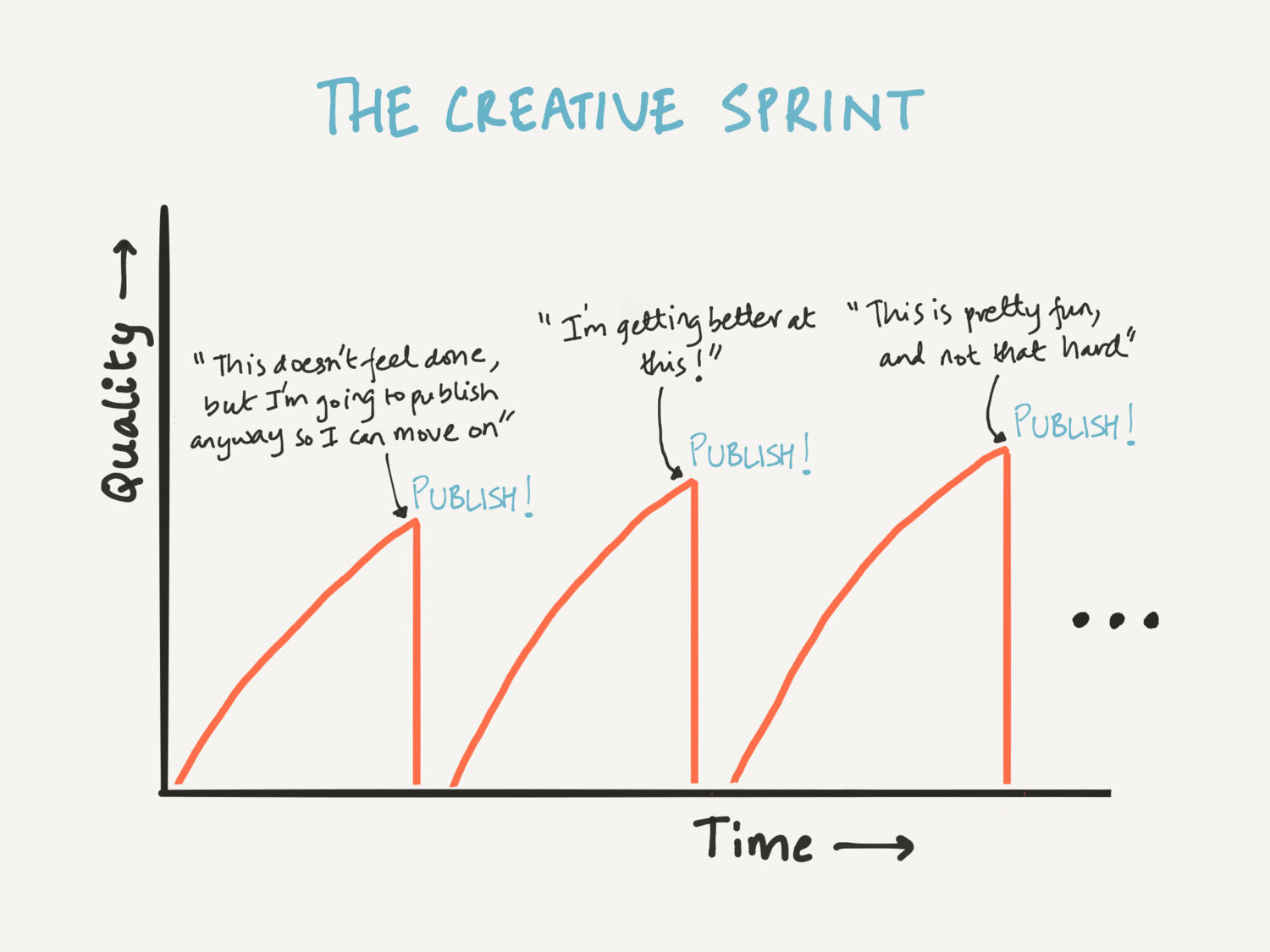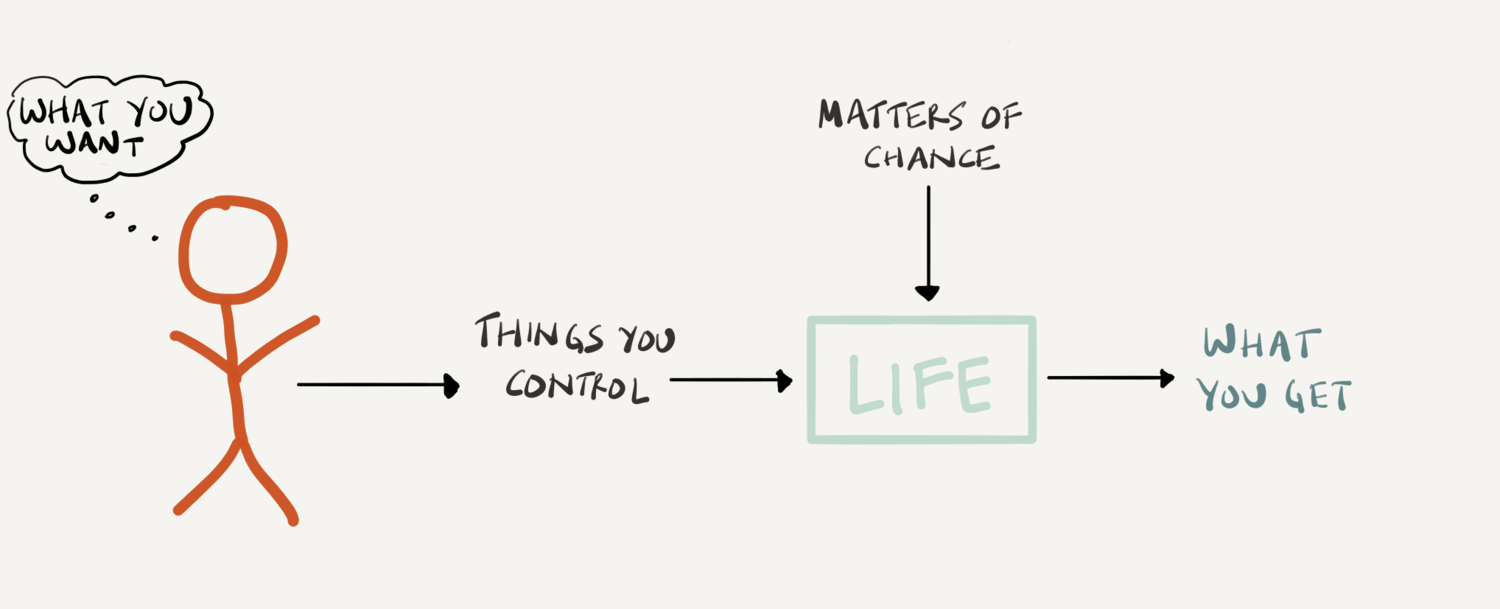My Guiding Principles
Watch your character, it becomes your destiny. - Lao Tzu

Why I'm writing this
Living a life firmly grounded in principles has always been important. If we look to the greats in any field — from Marcus Aurelius and Abraham Lincoln to Charlie Munger and Ray Dalio — much has been written about the principles behind their success. When we read about these people, we admire not only their success but also their character. The principles they practiced shaped their character, which became their destiny.
Today, in the age of the internet, I believe it is ever more important to live a life firmly grounded in principles. The internet, while being tremendously beneficial to the world, has created at least 3 fundamental problems, which my principles attempt to address for myself.
Problem 1: Choice
We have far more choices when it comes to the most important decisions in life - what to do, who to spend our lives with, and where to live. There are thousands of new careers that didn't exist a decade ago, and breaking into any of them is possible. Thanks to the internet, most people will have access to the same educational and informational resources. Society tells us we can do anything we set our minds to, and this is partly true. Online dating has drastically increased the dating pool. And thanks to remote work, we can increasingly live anywhere while we do anything. The problem is this — as our choices have increased exponentially, our ability to choose wisely has suffered.
Problem 2: Influence
Anyone can grab our attention through the devices in our pockets, and use it to influence us. Anyone, anywhere in the world, can plant their voice inside our mind. These voices tell us what to look like, what to wear, where to live, what to believe, who to vote for, and how to live. On social media, everyone is a brand and every post is an ad, vying for our attention. We are living in the age of influence. In a world where we are constantly bombarded by outside voices, cultivating and listening to our inner voice is harder than ever.
Problem 3: Disconnection
The internet has enabled us to reach anyone, anywhere with a few taps of our thumbs. Yet the rate of people self-reporting being lonely is on the rise. Rates of anxiety and depression, which are linked to a lack of social connection, have increased significantly in the last decade, especially amongst younger people. Research has shown that the lack of adequate social connection has an effect on our health that is comparable to obesity, smoking, and high blood pressure.
Could it be that the internet has caused this increase in disconnection, even while creating the illusion of the opposite? It's hard to make a conclusive case without controlled studies, but there is plenty of research linking the two. We live in an age of extreme connection to technology and increasing disconnection to ourselves, our communities, and nature.
In the face of the three problems of choice, influence, and disconnection, I believe our principles and our character are going to be the primary determinant of the level of peace, happiness and success we experience.
A principle as I use the term here is simply a heuristic to help me think and act. Over the last few years I have found and developed a collection of practical principles to guide me. I've built this collection through failure, suffering, and reflection, often inspired by people I've met and books I've read. For each principle had I applied it in the past, I would have avoided some short-term pain.
These principles are aspirational — I continue to learn to apply them and routinely fail at doing so. I am certain that these principles will evolve with time. My hope is that by putting them out in the world, I'll hold myself more accountable to them. My hope is also that by sharing my principles, I will encourage you, my reader, to reflect and write down your own principles. At the end of the article is a list of the books that have most shaped my guiding principles.
With that, here are my guiding principles.
Principle 1: Assume I'm wrong and ask how I can be less wrong.
Finding out what's right is more important than being right. As Carl Sagan said, truth is asymptotic, so I am always partially wrong. The goal is to have a system that allows me to get closer and closer to the truth. Assuming I'm wrong and trying to be less wrong is such a system.
James Clear is also a proponent of this system:
Trying to be right has a tendency to devolve into protecting your beliefs. Trying to be less wrong has a tendency to prompt more questions and intellectual humility.
It's okay to have strong opinions, as long as I hold them loosely. Opinions and perspectives give us a clear direction to act on. Holding them loosely and trying to be less wrong allows us to course-correct and improve your perspective.
Principle 2: Hold myself to a higher standard than I hold others.
This has two benefits — I hold myself to a higher standard, and more importantly I lower my expectations of others. When I find myself having an expectation of someone, ask myself if I always satisfy that expectation myself. If the answer is no, then let go of expecting better of the person. This is a tool to surface my hypocrisy. If I'm holding others to a higher standard than I hold myself to, then I'm being a hypocrite — and I hate being a hypocrite!
It's also an antidote for judgement. When I find myself judging someone for something, I am usually guilty of the same thing myself. I am holding the other to a higher standard than I hold myself to. Reflect and ask myself what I can do to hold myself to a higher standard, or accept myself and others as we are. Applying this principle may not remove the judgement altogether, but it can turn the judgement into a tool for self-reflection and growth.
Principle 3: Wealth is what I can give, not what I own
"Wealth is a positive-sum game, status is a zero-sum game. Ethical wealth creation is possible." — Naval Ravikant
Why is it important to define wealth for myself? Because I've noticed I tend to pursue wealth as a default. When there isn't another clear, overriding factor to guide decisions, I often default to choosing the wealth-maximizing option. At the same time, I've noticed I view wealth through the lens of greed. Getting wealthy, the thought goes, requires greed, and anyone who is wealthy must at some point have been greedy. This conflict created by maximizing wealth as a default and associating wealth with greed, I realized, only exists because the conventional definition of wealth is based on owning things.
My new definition of wealth includes not just things I own, but anything that I can give that others value. This includes conventional forms of wealth like money and real estate. It also includes unconventional forms of wealth like specific knowledge or skills that can be shared or taught (eg. online education), the ability to listen and provide support or guidance (eg. coaching or therapy), the ability to create an experience (eg. DJ-ing), etc.
These are latent forms of wealth. They can be exchanged for money, if needed, since others want them. The internet provides the leverage to reach a large number of people, and thus have a large paying audience. As long as I can provide something the world needs, I am wealthy, and I can cash in that wealth for money. Redefining wealth more broadly in this way allows me to dissociate wealth from greed and associate it with generosity.
Principle 4: Success is consistently doing what I said I would do.
There is no single definition of success that applies to everyone. Success is an extremely personal thing. As Derek Sivers said, to know if someone is successful, you need to first know what their intent is. If Richard Branson's intent was to live a quiet, peaceful life but he couldn't stop building companies, he wouldn't be successful.
The best definition of success I have come across is simply consistently doing what we said we would do. Thus, success is when action matches intent. When we consistently do what we said we would do, we feel successful and when we feel successful, we choose to do increasingly more grand, challenging things. With this as my definition of success, choosing the right intent becomes particularly important. To be successful then, I must say no to most opportunities, requests, and options. And when you I commit to doing something, I must live up to that commitment. This definition of success requires practicing the art of saying no and living up to my commitments.
Principle 5: Focus on what I control, everything else is chance.
As I wrote here, there are two types of things that determine whether we get what we want: things we control, and matters of chance. Everything falls into these two categories. I prefer to frame the latter category as matters of chance rather than as things outside of our control. Outside of our control is a loaded phrase that implies someone or something else is in control. It means we can blame someone or something else for the way things are, whether it’s a boss, a business partner, the economy, or the government.
The truth is that most things are outside of our control. Knowing this, it’s easy to fall into resignation — being resigned to whatever happens to us. Focusing on what we control does not mean giving up in the face of adversity. It does not mean avoiding big hairy audacious goals. It means focusing on the aspects of the big hairy audacious goals that we control. And there are always aspects that we control.
Outcomes are also a matter of chance. So don’t worry too much about the outcome, other than to learn from it and adjust your approach next time. As Bill Walsh said, "the score takes care of itself".
Principle 6: 80% is good enough.
I learned this lesson in my two very different experiences developing creative mastery - first with electronic music and then with writing. Perfection stopped me dead in my tracks the first time (pun very much intended). To fight my perfectionistic tendencies, I now declare a piece of creative work "done" when it feels about 80% done. This is especially useful in the early stages of creative mastery. I wrote about this here.
Ira Glass, the host of the long-running NPR show This American Life said
The most important possible thing you can do is do a lot of work — do a huge volume of work. Put yourself on a deadline so that every week, or every month, you know you’re going to finish one story. Because it’s only by actually going through a volume of work that you are actually going to catch up and close that gap. And the work you’re making will be as good as your ambitions. It takes a while, it’s gonna take you a while — it’s normal to take a while. And you just have to fight your way through that, okay
To create this huge volume of work, it's necessary to lower the bar for what you consider good enough or done. Perfect is the enemy of good. For me, 80% is good enough.
Principle 7: Systems over goals.
The problem with goals by themselves is achieving or not achieving them is usually at least partially out of my control. The second problem with goals is that until the moment they are achieved, I am in a state of continuous failure. And the third problem with goals is that once they are achieved, I lose the sense of purpose and direction that they gave me. I need to continuously create new goals, be in a continuous state of failure, experience success briefly (if at all), and then start over.
Scott Adams, the creator of the comic Dilbert, defines a system as the following:
A system is something you do on a regular basis that increases your odds of happiness in the long run. If you do something every day, it’s a system. If you’re waiting to achieve it someday in the future, it’s a goal
With a system, I succeed every time I successfully apply the system, doing which is usually fully under my control. Following a system makes it easy to consistently do what I said I would do, which is my definition of success. While I also have goals, and my systems are usually created with a goal in mind, I am systems-oriented rather than goal-oriented. My goals are achieved as a byproduct of following my systems, and my systems are continuously evolved to increase my odds of achieving my goals.
Principle 8: Listen to my body and feel all my feelings.
In my experience, the body contains just as much wisdom as the mind. We are alive because thousands of generations of our ancestors were born and were able to reproduce. Each ancestor in our lineage survived natural selection, so we won the genetic lottery. Their collective intelligence has been passed down as our instincts, impulses, intuition, and emotions. Though modern society has neglected the wisdom of the body, there is a growing body of research on the effectiveness of intuition and gut-feeling.
In addition, emotional intelligence is essential for good leadership. Part of emotional intelligence is being aware when emotions arise, being able to identify them, communicate about them, and finally release them. Feelings are supposed to be released, not repressed. When they are repressed, it can lead to physical and psychological problems. Repressed emotion can harden into a mood. Anger becomes bitterness. Fear becomes anxiety. Sadness becomes apathy.
Pain is inevitable but suffering is not. I try to fully feel and move through the pain, rather than avoiding it or suppressing it. Feelings are natural and expressing them is healthy. When we fully feel them, they can be teachers and guides.
Principle 9: Practice candor with compassion and empathy.
"A person’s success in life can usually be measured by the number of uncomfortable conversations he or she is willing to have." — Tim Ferriss.
Be candid. Speak what is true for me. Practice revealing rather than withholding thoughts, opinions, judgements and feelings — especially feelings of anger, fear and sadness.
The mind generates all kinds of judgments about people, circumstances, situations and conditions. Instead of seeing these judgements as right, simply see them as being present, and notice what they tell me about myself rather than about other people. Reveal my judgements not to make myself right or to change the other, but to make myself known and seen.
Practicing candor means matching inside experience to outside expression. It has been incredibly beneficial for my friendships, my relationship with my romantic partner, and how I show up in my community. There are three reasons why.
- Withholding takes more energy than revealing. Practicing candor means I spend less energy controlling my expression, and let expression be a natural consequence of experience.
- When I am candid people see me for who I really am and are more likely to express themselves candidly to me. This mutual vulnerability leads to more deep and connected relationships.
- By practicing candor I am practicing integrity. Every act of integrity solidifies my identity as a person of integrity, which in turn ensures that I continue to stay in integrity.
Nonviolent Communication is the best framework I know of to practice candor with compassion and empathy. It's also an effective framework to listen with compassion and empathy, allowing others to be more candid.
Principle 10: Put my oxygen mask on first.
Anyone who has flown in a commercial flight knows this phrase, so well that many of us even zone out during the safety presentation. You are asked to put your own oxygen mask on before helping others simply because you can't help others well until you help yourself. You can't be an effective contributor until you meet your own basic needs. This is not selfish.
For me, this means taking care of myself and meeting my basic needs comes before my purpose, my contributions, my community and my career. It means I don't compromise on health, nutrition, exercise, and sleep. It means I prioritize the things that I need to recharge my energy tank, because in the long run that will make me more effective as a contributor, as a leader, and as a friend.
I've had a string of injuries and chronic pain for long periods of time. Because of them I came to realize the truth in this Confucius saying
"A healthy man wants a thousand things, a sick man only wants one."
Now I remind myself as a healthy man, the first thing I want is to stay healthy.
What are your guiding principles?
Below is a list of the books that have most shaped my guiding principles. While reading the principles of others can serve as ammunition, our different personalities, psyches, experiences, and challenges mean that we need different principles to guide us. I encourage you to define your own principles for yourself.
- 15 commitments of Conscious Leadership, by Jim Dethmer & Diana Chapman
- The Almanack of Naval, by Eric Jorgenson
- How to fail at everything and still win big, by Scott Adams
- The Four Agreements, by Don Miguel Ruiz
- Principles, by Ray Dalio
- The Tibetan book of Living and Dying, by Sogyal Rinpoche
- Nonviolent Communication, by Marshall Rosenberg
Join the mailing list
Subscribe to receive my latest writing in your inbox. No spam, ever.


